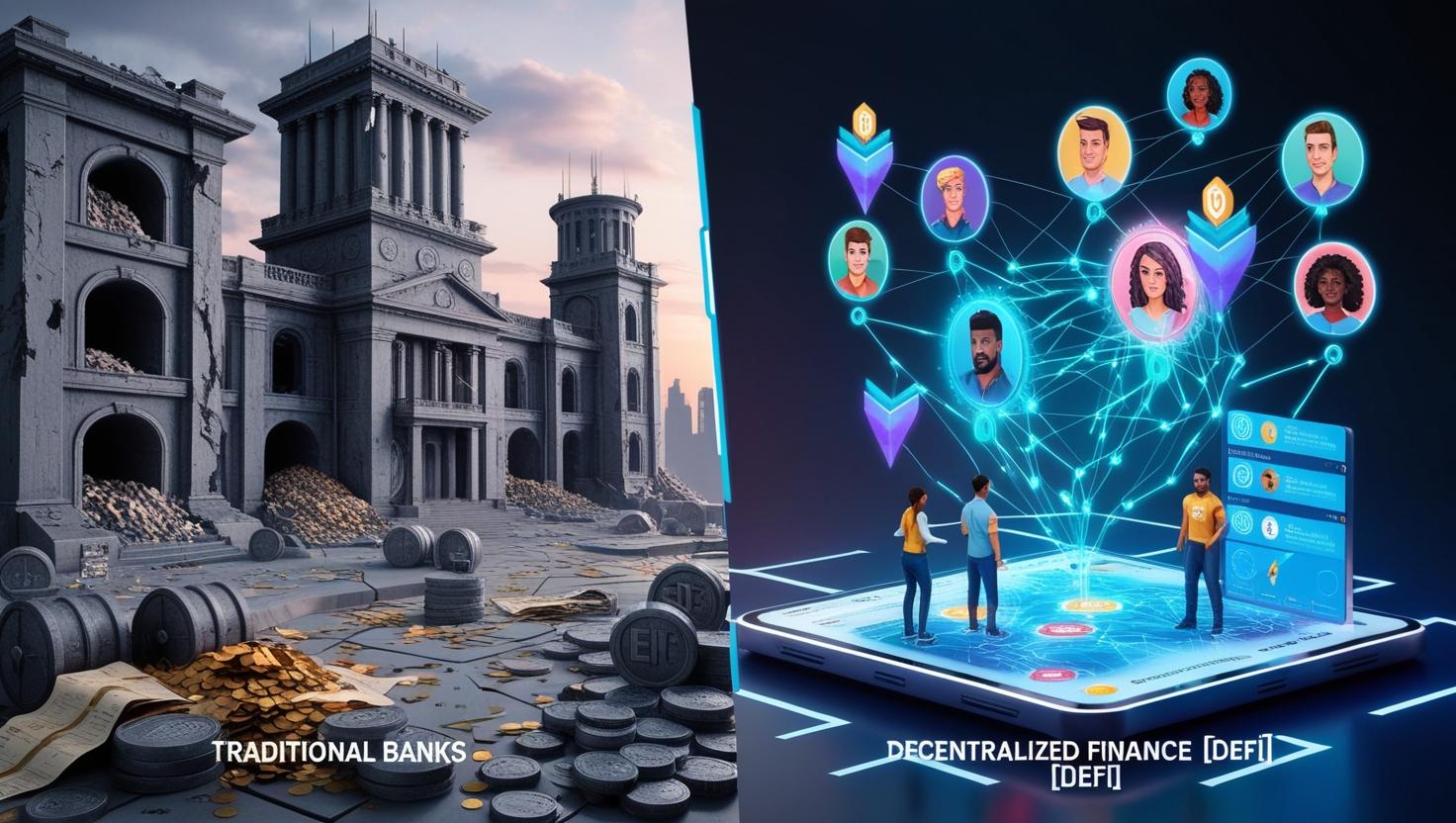In today’s fast-moving digital world, you already know that traditional finance is struggling to keep up. Long settlement times, costly intermediaries, and limited access have left individuals and businesses frustrated—incredibly when faster, more innovative alternatives are emerging every day.
We can all agree that finance is due for a revolution, and that revolution will be brought by Fintech Companies using Blockchain technology.
In this article, you’ll discover precisely how fintech companies are using Blockchain technology to innovate platforms like DeFi (Decentralized Finance), smart contracts, and blockchain-based cross-border payment systems. They are disrupting the traditional finance model and replacing it with faster, more transparent, and inclusive solutions.
Introduction: Fintech Companies Using Blockchain Technology:
Blockchain is a decentralized digital ledger that keeps a record of transactions by a network usually known as cryptography, which is difficult to hack or alter. All the records are encrypted in blocks, and the chain of blocks resembles the length of transactions, which are verified by computer networks and kept as a record. Therefore, this secure system where verified data with a series of actions known as transactions are converted into records, and a list of records is encrypted in the block, and the chain of blocks signifies the digital ledger; hence, it is known as Blockchain. Blockchain technology is revolutionizing the fintech industry because of its high level of security, transparency, reduced cost, and time-efficient processes.
Blockchain technology is already as popular as Bitcoin, Ethereum, and other cryptocurrencies. Its applications and utilizations are far more demanding in sectors where keeping data or transactions recorded safely and securely is vital, such as the Healthcare, Legal, Banking, Supply Chain, and Real Estate industries.
Moreover, as technology advances in Finance, becoming Fintech and integrated with blockchain technology, it encompasses a wide range of sectors such as decentralizing finance [DeFi], the insurance sector, the credit or loan sector, reshaping the payment industry, and smoothing cross-border transactions. All these sectors can easily benefit from adopting digital finance solutions provided by Blockchain technology. This article will explore some sectors, such as smart contracts, Decentralized finance [DeFi], and cross-border payments, and how Blockchain technology is reshaping the Fintech industry.
Market Growth and Emerging Trends of Fintech Companies Using Blockchain Technology:
Fintech companies using Blockchain Technology around the globe are growing at a breakneck pace. In 2024, the expansion of Fintech companies was valued at approximately $480 billion, increasing to $700 billion in 2025. Experts’ forecasts indicate it could reach around $21.59 trillion by 2034, reflecting a compound annual growth rate (CAGR) of 46.31% between 2025 and 2034. This significant growth is due to the adoption of digital payment solutions; people use mobile payment, online banking, and lending platforms to provide loans and credit hassle-free.
Additionally, Traditional Finance Corporations are integrating Fintech into their business models. Now, the dependency on infrastructure has reduced, and the focus is more on the core banking systems to provide better customer experiences. Moreover, institutions are concerned about providing data connectivity to the underserved or unbanked population to facilitate their services easily.
The new digital payment solutions are decentralizing banking systems and providing convenience to customers who buy goods or services and, in return, pay them digitally by cards, mobile, etc. The rise of digital payment solutions is the main reason behind the surge of Fintech companies.
In addition, fintech companies using blockchain technology are innovating different models and platforms for the payment industry, asset management, crypto market, supply chain finance, and real estate ownership and tokenization.
| Organizations | Industry | Use case |
| Ripple | Digital Currency | Cross border Payments |
| IBM | Hyperledger Fabric | Supply Chain Finance |
| JP Morgan Chase | Finance | Cross border Payments |
| MedRec | HealthCare | Smart contract for medical purposes |
| Home Depot | Retail | Supply Chain Retail |
| Coinbase | Digital Asset | Cryptocurrency Exchange |
| Arbol | Insurance | Smart contract for Payouts |
| Amazon Web Services [AWB] | Online Service | DeFi, Financial Services |
Table: Chart of Fintech Companies Using Blockchain Technology
There has been a rapid rise in demand for Fintech companies using blockchain technology. This technology allows for secure, real-time financial transactions across borders without interference from any third party.
Decentralized Finance [DeFi]: Transforming Traditional Finance:
Demystifying Decentralized Finance [Defi]:
Decentralized finance [DeFi] is a financial platform that uses secure distributed ledgers to store transparent financial transactions in a network. It depends on cryptocurrency, blockchain technology, and software to enable direct and peer-to-peer financial interaction and automatically execute secure transactions stored in a network without intermediaries or centralized institutions.
Decentralized Finance [DeFi] is an innovation in managing finances that differs from traditional banking models. In the DeFi model, transactions between two individuals or businesses are called peer-to-peer transactions.
It operates on Blockchain Technology, giving people more control over their finances and allowing them to handle them directly. This ecosystem is open to everyone; the main objective is to make financial services more accessible and inclusive for the people whom traditional banking systems have ignored.
The key factor of Decentralized Finance [DeFi] is eliminating the role of third parties and other financial institutions. This allows people to perform financial transactions independently, reducing cost and transaction time.

Working of DeFi: Asset Management on Blockchain Technology:
Decentralized Finance [DeFi] is built on Blockchain technology. It utilizes an app known as Wallets to send data to the blockchain. These wallets contain passwords with secret codes that allow users to store and manage their digital money or tokens. For instance, they would use their wallets to move or send their tokens to someone else. Then the receiver’s wallet generates a new secret code, ensuring the delivery of tokens. The blockchain system then confirms that the transfer is completely executed and registered. All transactions are then recorded and stored in blocks securely, enabling people to transport their digital money safely.
Benefits and Risks Associated with DeFi Platforms:
The rise in Fintech companies’ growth is mainly because of digital payment solutions. Fintech companies are now moving one step higher by integrating with Blockchain technology, transcending to Decentralization of Finance [DeFi]. A platform that enables individuals to do a transaction without any third-party interference is also popular as peer-to-peer transactions.
In addition, the Defi platform will extend financial services to underserved or unbanked populations that were previously ignored in traditional banking models. Blockchain technology enables the Defi Platform to provide financial services at very low or no fees, as third parties are eliminated between financial transactions.
Moreover, financial transactions have become more transparent and safeguarded after the evolution of Fintech companies using Blockchain Technology.
The major risk associated with Defi platforms is that they are newly launched, and most of the market is largely unregulated, which enhances security vulnerabilities and risk exposure. This game-changing financial technology is lacking behind the widespread adoption, due to which regulatory challenges are overcoming the landscape.
Smart Contracts: Automating Contract Agreements:
A smart contract is a digital contract programmed to manage the transfer of digital assets between a peer-to-peer network to execute an agreement between a buyer and a seller directly and automatically. The rules of this agreement are written directly in the program’s code. The code and its agreement are stored as records in a distributed, decentralized blockchain network.
Furthermore, all the transactions and agreement lists are recorded and embedded in blocks. A number of blocks linked to the chain resembles the history of the agreement and transactional data, and the code controls the execution.
Smart contracts are software programs that store records of transactions and agreements between individuals or businesses and perform several actions under specific conditions without the involvement of third parties.
When Smart contracts are linked with Blockchain technology, all the records [agreements and transactions] become transparent, which means they are visible to anyone. Therefore, individuals can check past activities but cannot change them. Also, building trust and protecting digital transactions.
Fintech companies using Blockchain Technology adapt Smart contracts to automate the system, deploy transparency, and track activities, enhancing their overall efficiency. Their integration with blockchain will bring more development in areas such as Finance, Supply chain, Healthcare, and Real estate.

Cross Border Payments: Enhancing Global Transactions:
Fintech Companies Using Blockchain Technology are rising in demand globally due to their applications’ utilization in different industry areas. For example, the Finance industry is largely evolving after integrating with innovative Blockchain technology. Its various sectors, such as Banking, Insurance, Investments, and Stock Exchanges, are witnessing drastic changes in operations, enabling them to work efficiently and provide greater results quickly.
Moreover, Fintech companies using blockchain technology are significantly developing the payment industry, especially cross-border payments. Financial companies following traditional models are integrating with fintech, providing blockchain solutions to build secure, low-cost, traceability, and fast international transactions, boosting both economic and business growth for blockchain-based Fintech Firms.
Blockchain technology provides a distributed ledger on which encrypted records travel faster on its network. It also eliminates middlemen from traditional models, resulting in fast settlement of cross-border payments and better security and transparency between people or businesses.
The main key feature in providing instant transfer of payments across borders is real-time payment rails built on blockchain. Real-time payment rails are capable of instant settlement and are helpful in reducing time in cross-border payments.
The Global cross-border payment market is $194.6Tn in 2024 and is expected to reach $320Tn by 2032. The emerging trend of international transactions is globally adopted by Fintech companies using Blockchain Technology to provide real-time cross-border payments instantly between borders.
Conclusion:

In this fast-moving world, Fintech companies using Blockchain Technology stand out as catalysts for change. Blockchain solutions reshape how digital transaction solutions are introduced worldwide and empower security, transparency, and time-saving processes.
Traditional Financial institutions are integrating with blockchain and innovating new platforms like Decentralized Finance [DeFi], focusing on providing services to underbanked or underserved populations. In addition, Defi eliminates middlemen from transactions, making them more efficient, transparent, and time-saving. The introduction of smart contracts has also changed the face of fintech companies that use blockchain technology. Innovative contract software benefits the Fintech, Real estate, supply chain, Healthcare, and retail sectors.
Moreover, blockchain has improved cross-border payment by applying real-time applications that reduce transfer time, provide better transparency, reduce costs, and enhance security.
The future of Blockchain technology has widespread adoption potential; due to its decentralization, it becomes more important to address regulatory compliance, as no practical framework has been developed to ensure compliance and consumer protection.
In the future, companies will adapt their regulatory framework to increase their capabilities by extending their horizons in different sectors. The future of Blockchain companies looks progressive and significant, as its adoption will be essential in the corporate finance world.
FAQ’s
- What is blockchain technology, and what is its relation to finance companies?
Blockchain is a protected digital record that tracks transactions across a network, making it impossible to alter or change. It’s important for finance companies because it reduces expenses, speeds up processes, and provides clear visibility—ideal for various tasks, from money transfers to agreement handling.
2. What’s DeFi, and how is it different from traditional banks?
DeFi (Decentralized Finance) uses blockchain technology to allow people to handle money directly with each other, without banks or any third party in between. Unlike traditional banking, DeFi is available to everyone, works all the time, and often costs less.
3. How do smart contracts make agreements easier?
Smart contracts are self-executing digital agreements set up on blockchain technology. They automatically perform tasks (like transactions) when certain conditions are met, eliminating paperwork and mistakes. For example, insurance payments can happen immediately after a claim is checked.
4. Why are cross-border payments faster with blockchain?
Blockchain avoids slow, expensive intermediaries (like banks) using a worldwide network to check transactions instantly. This means sending money to other countries takes moments, not multiple days, with smaller fees and better protection.
May you like: 10 REGRETS TO AVOID: “INSURANCE POLICIES YOU CAN’T AFFORD TO SKIP”
5 CAR INSURANCE MYTHS DEBUNKED: UNVEILING THE TRUTH TO EMPOWER YOU
https://financeguruinsights.com/top-5-fintech-using-ai-credit-score-rating
